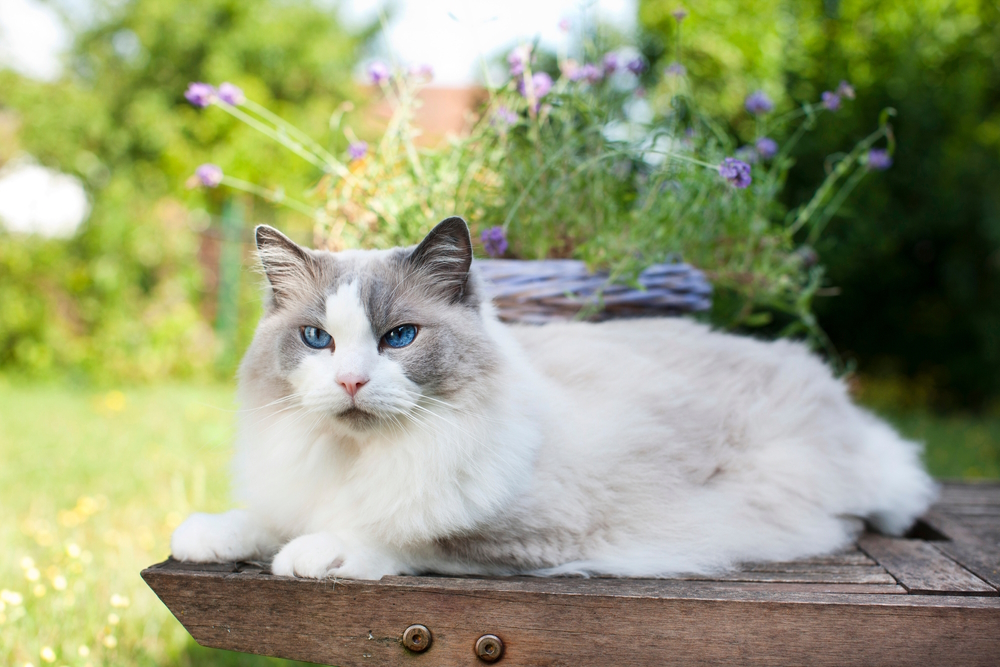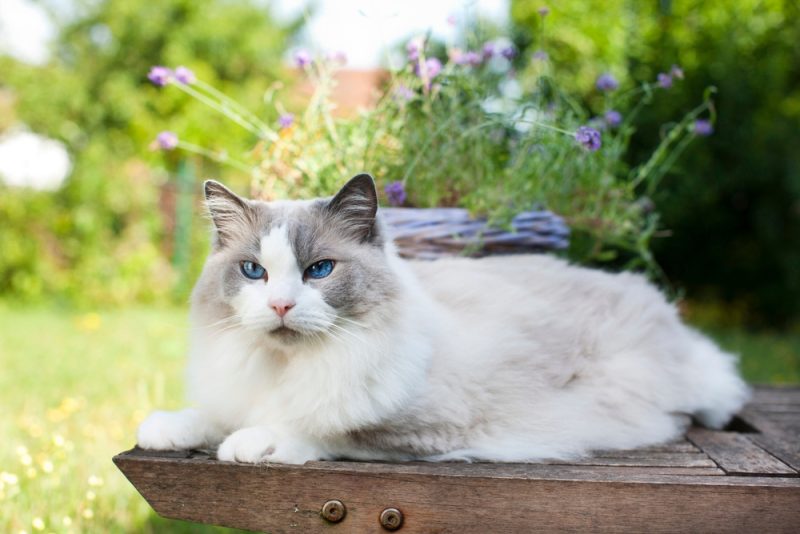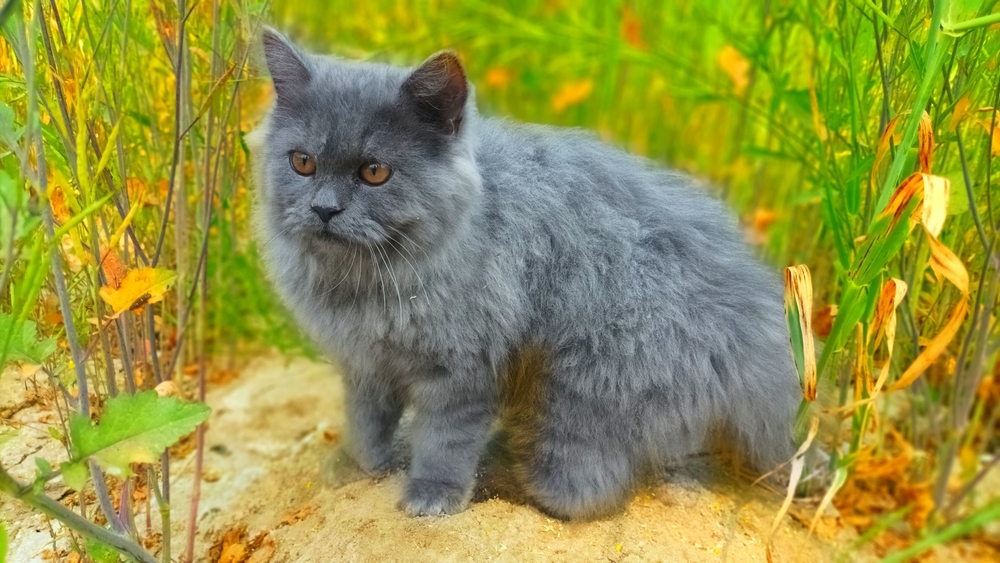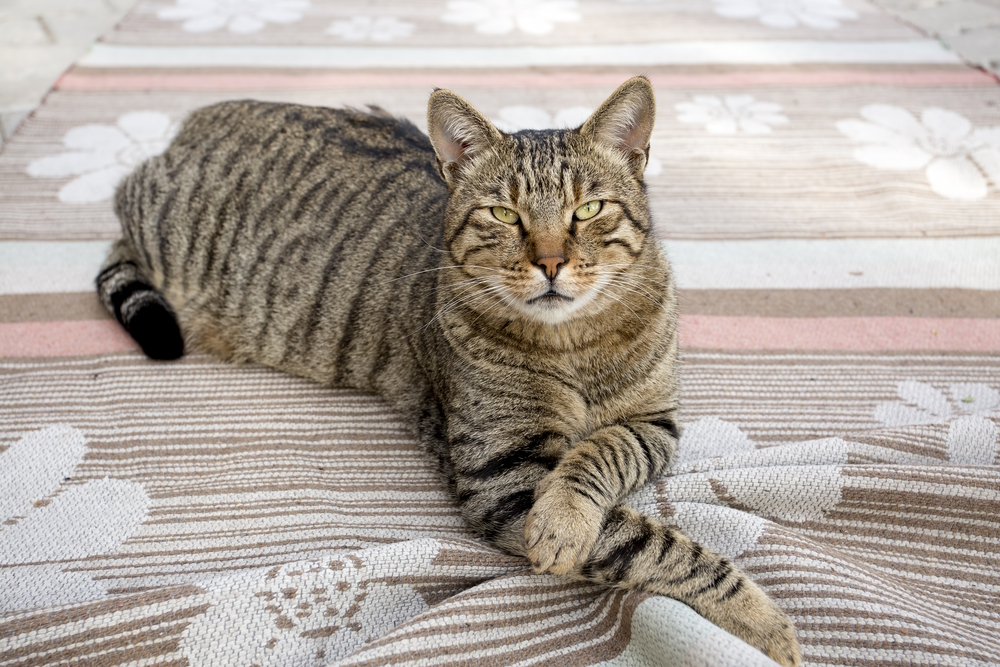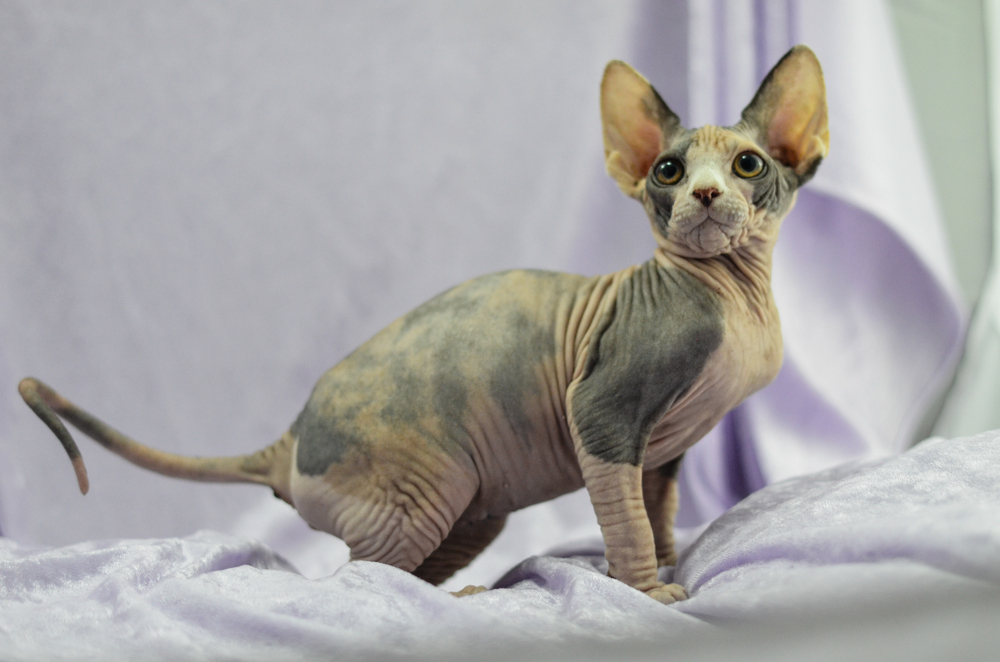Some cats are louder than others, so while you might be a bona fide cat lover, it’s okay to not be keen on midnight wake-up calls from your feline friend. Cats use many different vocalizations to communicate both among themselves and with their owners. It’s true that certain breeds can be louder than others. The good news is that there are plenty of cat breeds that are quiet, if not almost silent.
We rounded up the silent cat breeds that are known for their quiet natures. All the breeds included on this list will still purr and let you know that they love you, but they’re unlikely to alarm you with their decibel levels.
It’s important to note that while we’ve selected the quietest cat breeds, no cat is guaranteed to be completely silent!
The 20 Silent Cat Breeds
1. Chartreux
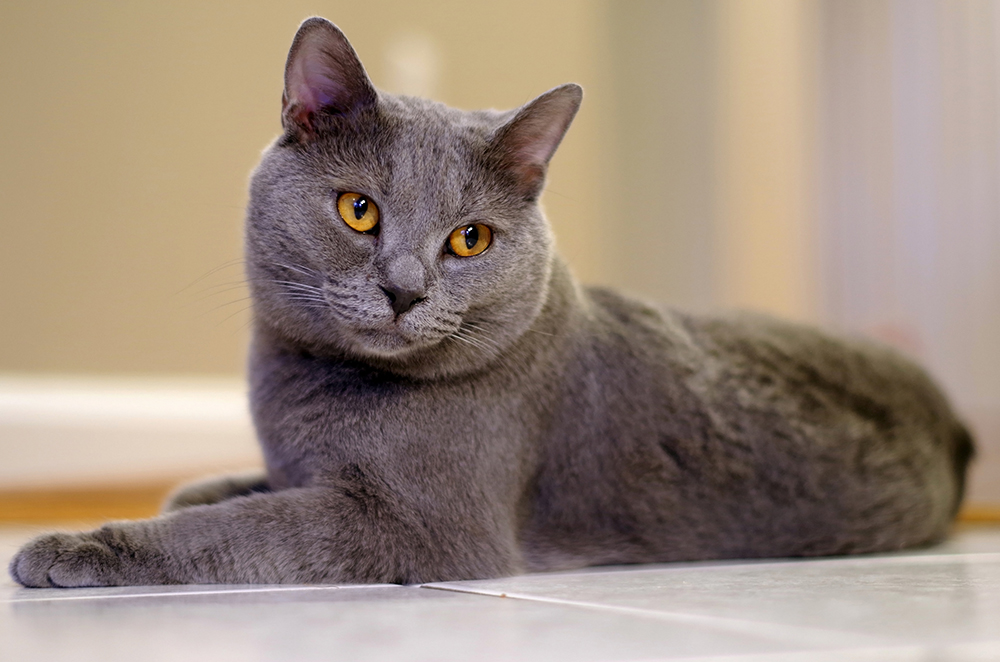
| Lifespan: | 11 – 15 years |
| Temperament: | Affectionate and playful |
| Coat Colors: | Blue |
| Weight: | 7 – 16 pounds |
| Shedding: | Medium to high |
The Chartreux cat breed has a stunning slate-blue coat and hails from the Carthusian monks of 18th-century France. These quiet cats made perfect mousers for the silent monastery and were also popular with farmers. Chartreux cats are quiet but can still effectively communicate with their owners! These cats love short bursts of play interspersed with a long nap somewhere near their human. Chartreux cats are adaptable and calm, making them a great choice as family cats. They even enjoy going for walks and road trips.
2. Birman
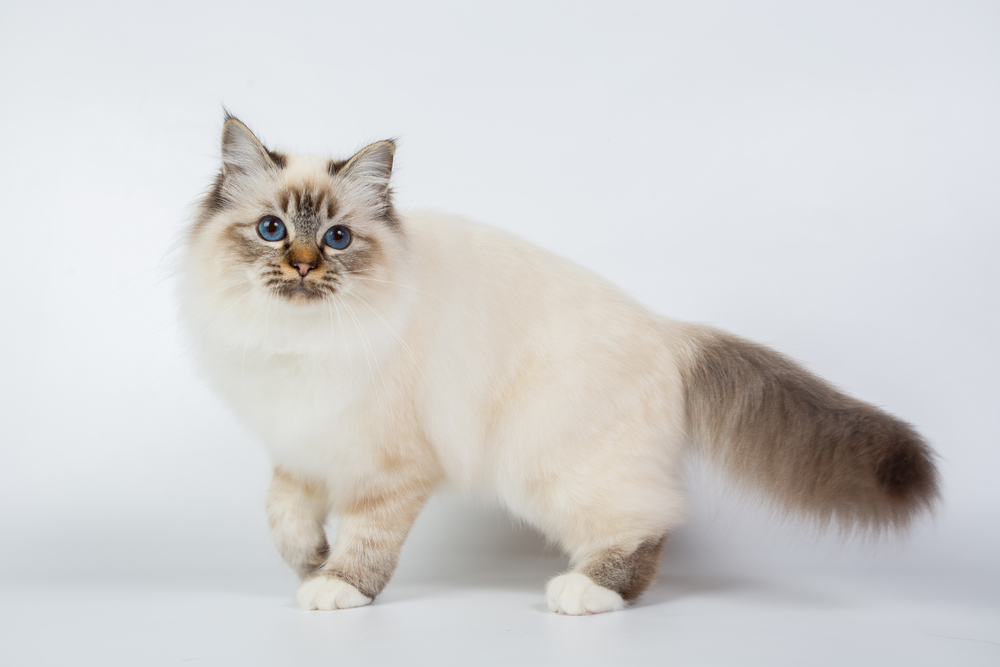
| Lifespan: | 12 – 16 years |
| Temperament: | Calm and intelligent |
| Coat Colors: | A range of Himalayan pointed shades |
| Weight: | 6 – 12 pounds |
| Shedding: | Medium |
The beautiful Birman can be traced back to Burma, where they’re revered as sacred. It’s thought that they have a blend of Persian, Angora, and Siamese blood in their ancestry. Unlike the Siamese, the Birman is quiet and calm. They love to be close to their humans, but always in an undemanding way. Birmans might be laidback and chill, but that doesn’t mean they’re not smart. They love learning new tricks and make a great choice of cat if you want to try out clicker training and start taking your cat for walks and adventures.
3. Havana Brown
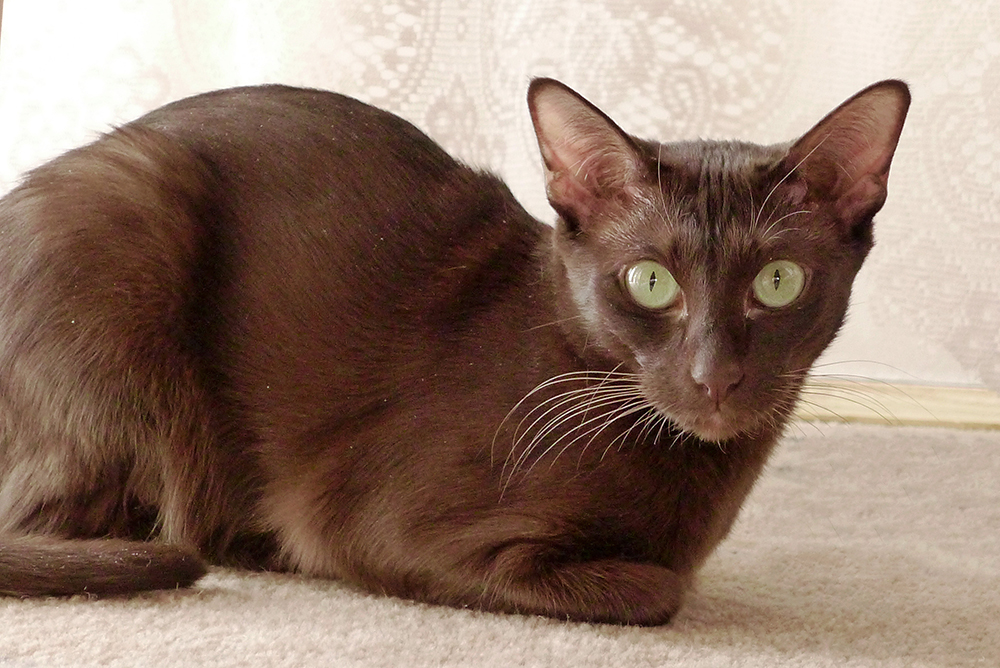
| Lifespan: | 10 – 15 years |
| Temperament: | People-oriented and smart |
| Coat Colors: | Deep tobacco brown |
| Weight: | 6 – 10 pounds |
| Shedding: | Low to medium |
The stunning Havana Brown breed doesn’t have anything to do with Cuba, regardless of what the name might suggest. Their coat might be the same rich brown as a Cuban cigar, but their origins are thought to be with Siamese-type cats that had a solid brown coat rather than the classic pointed version. The breed is rare, but anyone who owns them quickly becomes a fan. They possess many Siamese traits but are much softer-spoken. They may meow a little more than some other breeds on this list, but they are still relatively quiet.
4. Cornish Rex
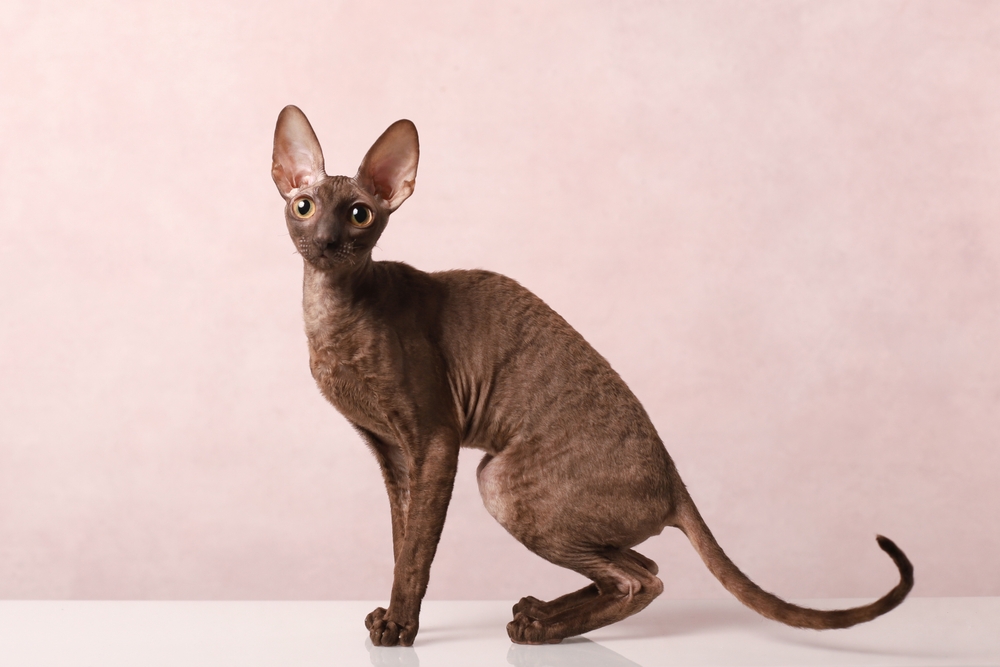
| Lifespan: | 11 – 15 years |
| Temperament: | Enthusiastic and active |
| Coat Colors: | Many solid and patterned colors |
| Weight: | 6 – 10 pounds |
| Shedding: | Low |
The stunning Cornish Rex is a natural breed discovered in 1950. Their curly and short coat is due to a genetic mutation that affects the texture of their fur. The Cornish Rex may look elegant and refined at first glance, but they’re mischievous and playful under that exterior. Many owners compare the character of their Cornish Rex to the enthusiasm of dogs. These cats love to learn tricks and play fetch, and they love nothing more than spending time with their owners. They’re not loud, but you’ll always know where they are!
5. Ragdoll
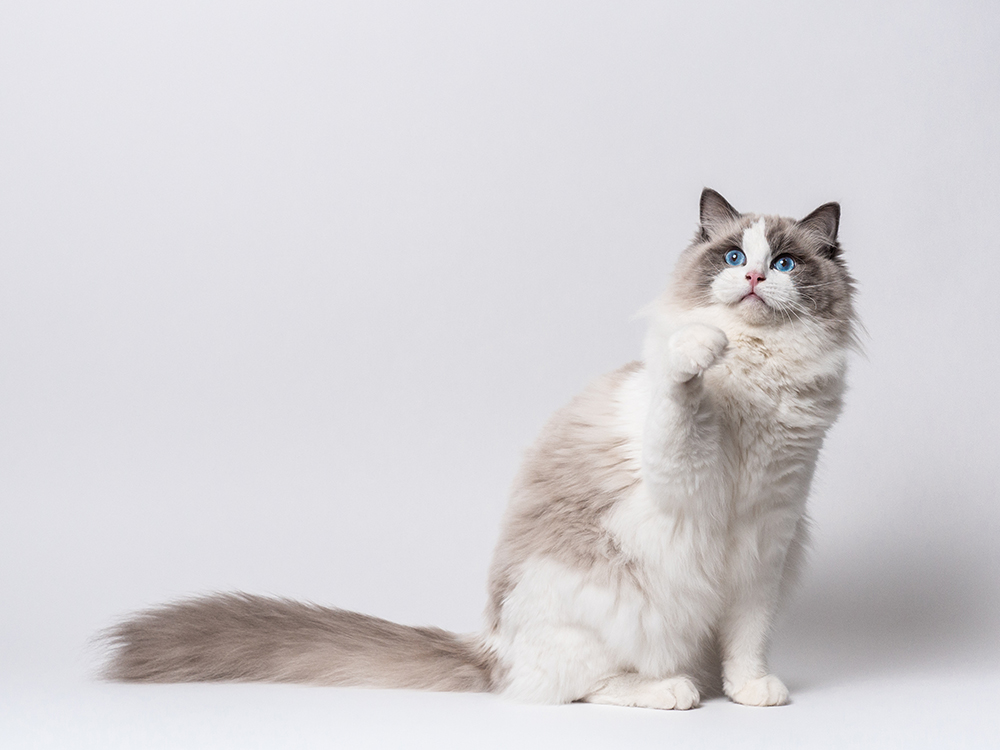
| Lifespan: | 12 – 17 years |
| Temperament: | Gentle and affectionate |
| Coat Colors: | A variety of pointed Himalayan patterns |
| Weight: | 10 – 20 pounds |
| Shedding: | High |
The Ragdoll is a relatively young breed and was first developed in the 1960s. Their long-haired coats, combined with their striking Himalayan pointed coats and vibrant blue eyes, have won them a legion of loyal fans. Their name comes from their habit of flopping in the arms of anyone who picks them up. Their gentle and affectionate natures mean they make great choices for families, and they’re active enough to spend time playing with kids or other pets. Ragdolls are intelligent and can quickly pick up new tricks. They have a quiet meow that they don’t use often.
6. LaPerm
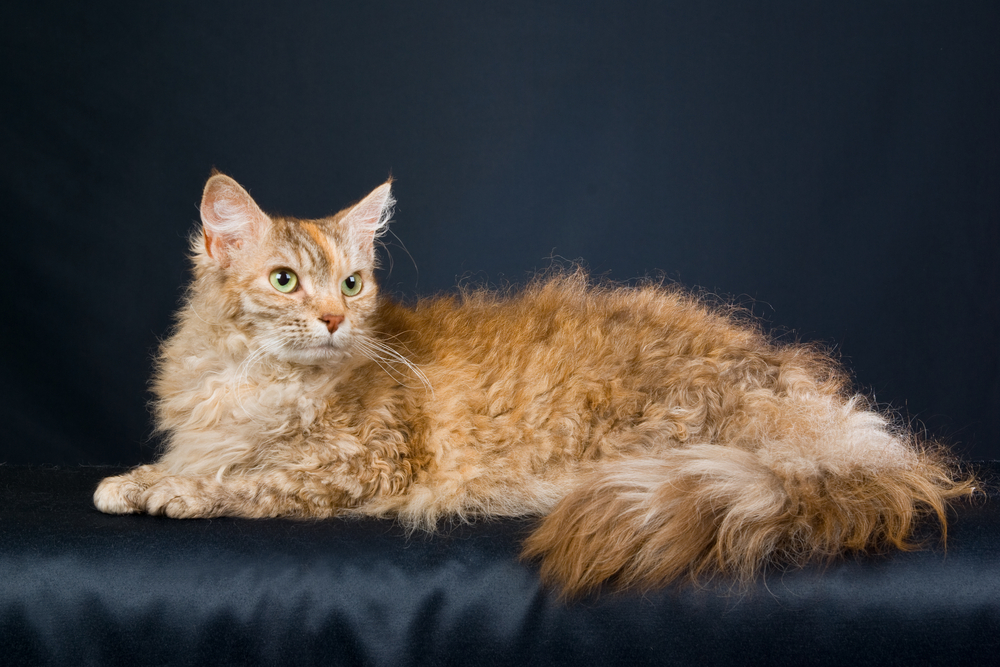
| Lifespan: | 10 – 15 years |
| Temperament: | Playful and mischievous |
| Coat Colors: | Any color or pattern |
| Weight: | 5 – 8 pounds |
| Shedding: | Low |
The striking LaPerm has a profuse medium-length coat with a bouncy curled texture. This distinctive coat is due to a genetic mutation that occurred naturally in a litter of kittens born in 1982 in Oregon. One kitten was born bald and eventually grew a curly coat and was called Curly! This is a small breed with a big sense of humor! They love to follow their owners around the house, investigate things with their paws, and generally see what trouble that they can create. They might be mischievous but they’re not vocal, and you’ll rarely hear them make a noise other than purring!
7. Singapura
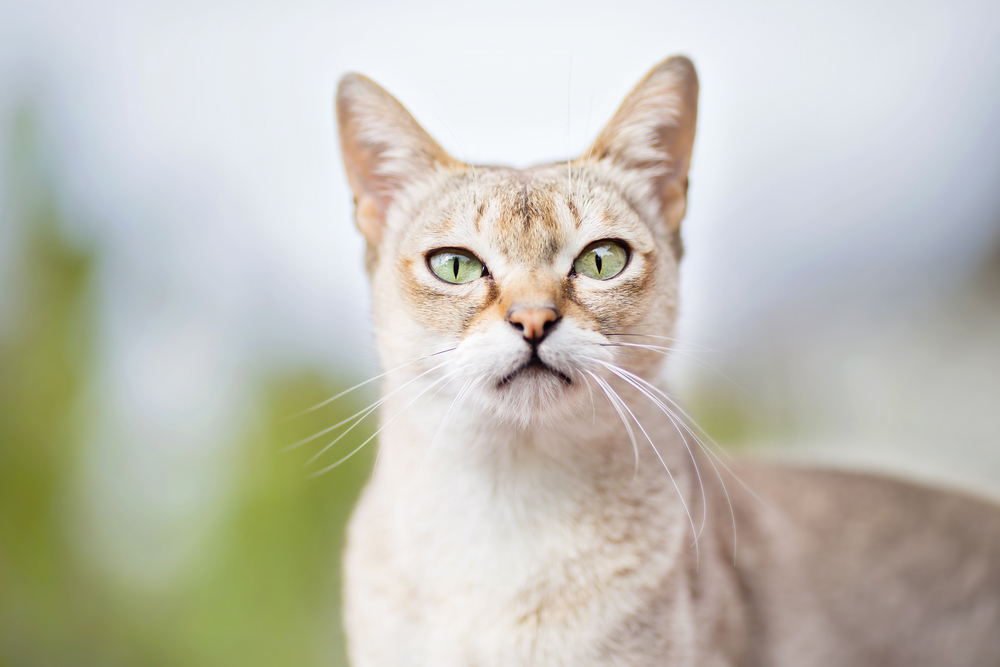
| Lifespan: | 11 – 15 years |
| Temperament: | Active and outgoing |
| Coat Colors: | Brown-ticked agouti |
| Weight: | 4 – 7 pounds |
| Shedding: | Low |
The delicate Singapura breed was developed from street cats found in Singapore. It’s thought that they’re related to Burmese and Siamese. These small cats only come in one coat color: brown-ticked agouti. They’re quiet in terms of how much noise they make, but you’ll certainly know that you share your house with one of these cats! They’re playful and active and love spending time snuggled up with their humans. They also love to climb, so you’ll need to provide plenty of high places for your little cat to hang out and cause trouble!
8. Persian
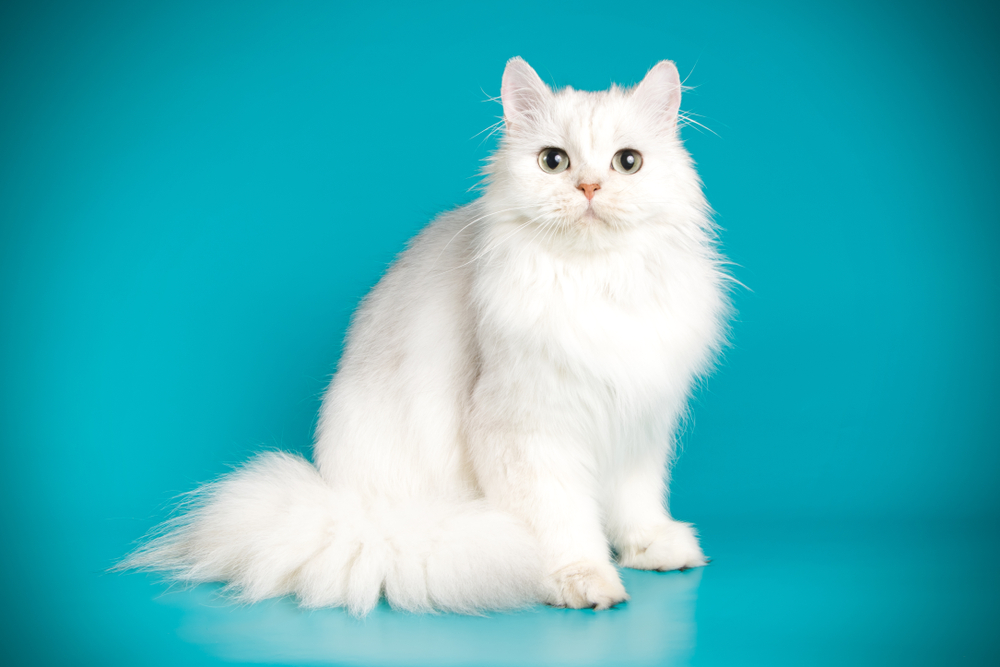
| Lifespan: | 10 – 15 years |
| Temperament: | Laidback and dignified |
| Coat Colors: | Blue, black, cameo (red), cream, blue-cream smoke, bi-color, smoke tortoiseshell, and more |
| Weight: | 7 – 12 pounds |
| Shedding: | High |
The Persian is an ancient cat breed whose origins can be traced back to Persia. They were the first long-haired breed brought to Europe. The snub-nose and rounded cheeks of the Persian have made them one of the most popular breeds of cats worldwide. Persians are docile and gentle and rarely make much noise. They love their families but will be reserved with strangers. They get along well with quiet children, but a busy house may be too stressful for these calm and serene cats.
9. Siberian Cat
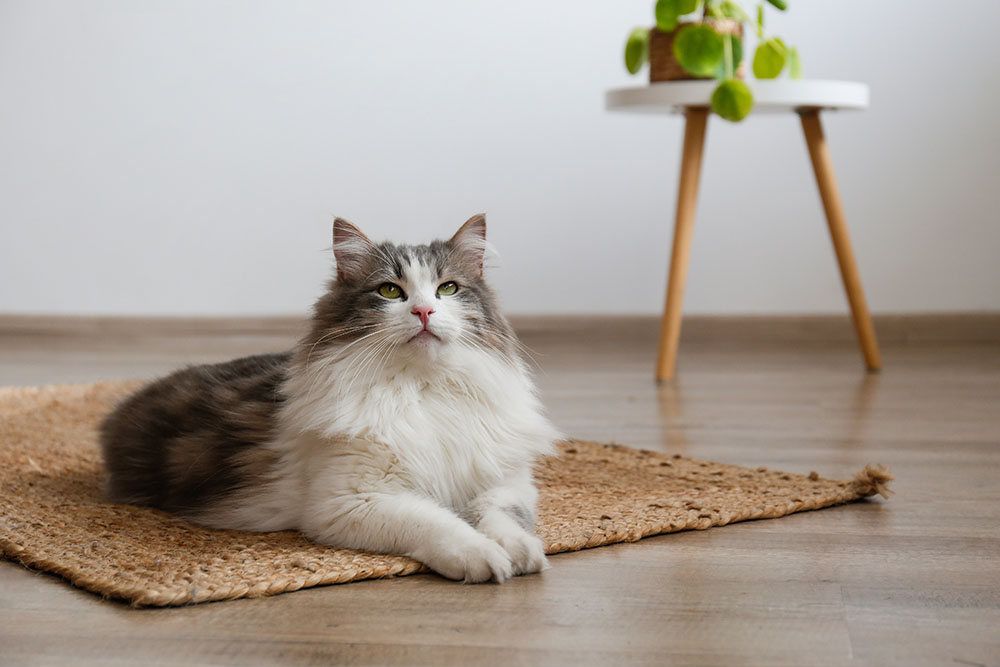
| Lifespan: | 11 – 18 years |
| Temperament: | Active and affectionate |
| Coat Colors: | All color combinations |
| Weight: | 8 – 17 pounds |
| Shedding: | Medium to high |
The imposing Siberian cat is a natural breed that hails from the subarctic Siberia region. They frequently feature in ancient Russian folktales, indicating that they’ve been around for thousands of years. Their profuse double coat helps keep them warm in bitterly cold temperatures, but this breed has easily made the transition to life as a domestic cat! They love to spend time with people and frequently follow their owners around the house. They don’t meow often and are confident enough to spend time with strangers. They love learning tricks and are one of the few cat breeds that enjoy playing in water.
10. Scottish Fold
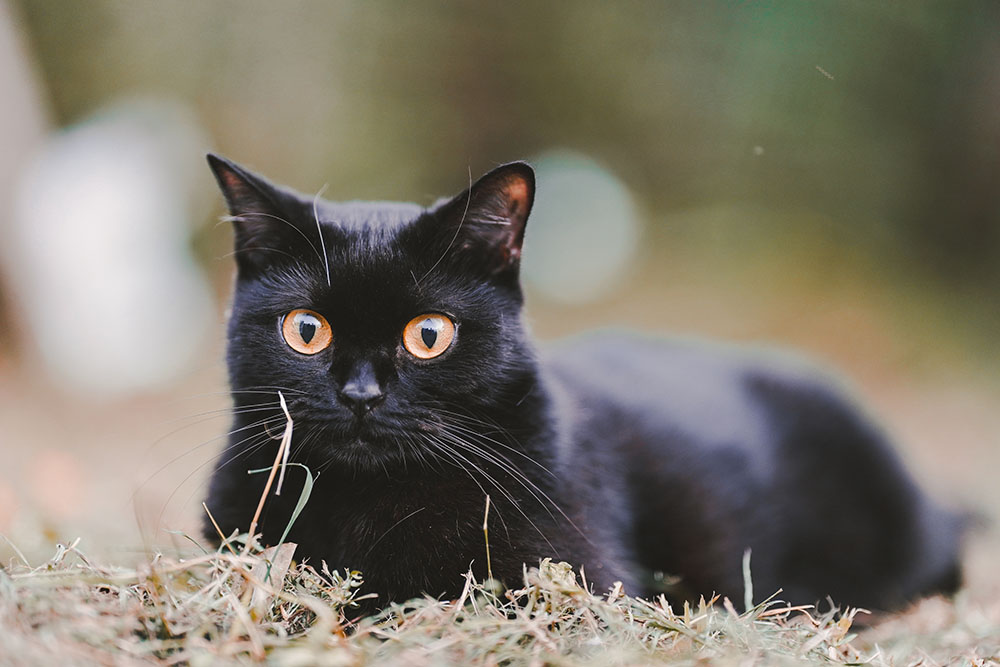
| Lifespan: | 11 – 14 years |
| Temperament: | Sensitive and people-oriented |
| Coat Colors: | Many colors in tabby, solid, bicolor, and particolor combinations |
| Weight: | 6 – 13 pounds |
| Shedding: | Medium |
The adorable Scottish Fold is best known for their distinctive folded ears. Their unusual ears are the result of a genetic mutation that was discovered in the Tayside region of Scotland. They’re a popular breed in the U.S.A. but aren’t officially recognized in their home country. These compact cats are relatively active but enjoy plenty of time relaxing, often in strange positions, like on their backs with all paws in the air or stretched out flat with all paws extended. They have a quiet way of asking for what they want and grow very attached to their families
11. American Curl
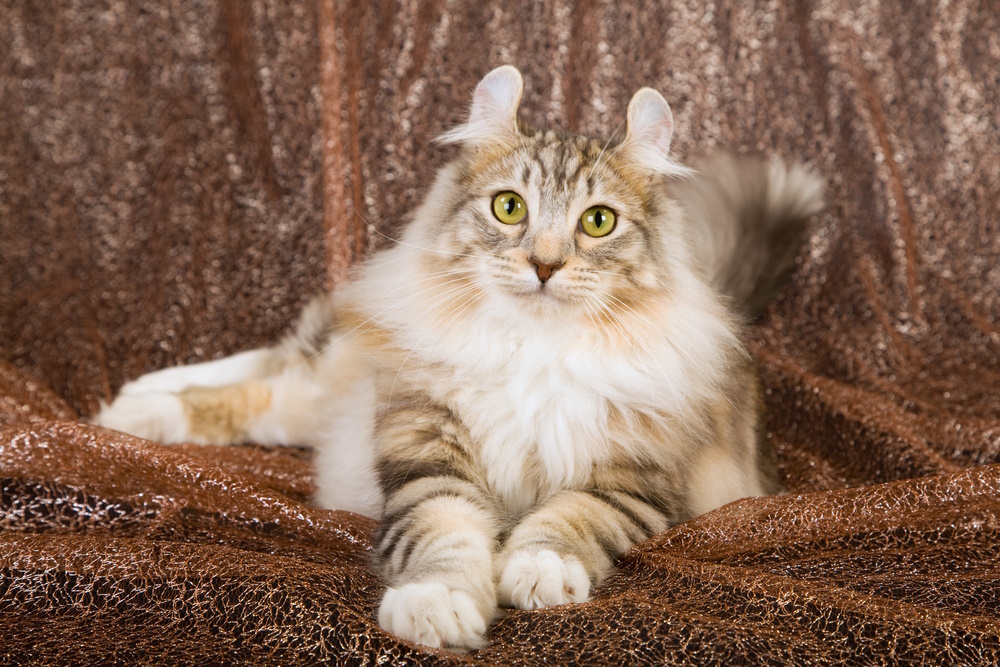
| Lifespan: | 12 – 16 years |
| Temperament: | Friendly and outgoing |
| Coat Colors: | Almost all colors and patterns |
| Weight: | 5-10 pounds |
| Shedding: | High |
The American Curl is a relatively new cat breed, only being discovered in 1981. A stray by the name of Shulamith was found with a litter of kittens, two of which had curled ears. This was due to a natural genetic mutation. American Curls are people-oriented and relatively active. They’re not talkative, but they’ll always be keeping a close eye on what you’re doing. They’re also extremely playful, a trait that doesn’t lessen in adulthood. American Curls love to learn tricks and spend time playing with their owners, and they even enjoy going for walks on a leash.
12. Pixie-Bob
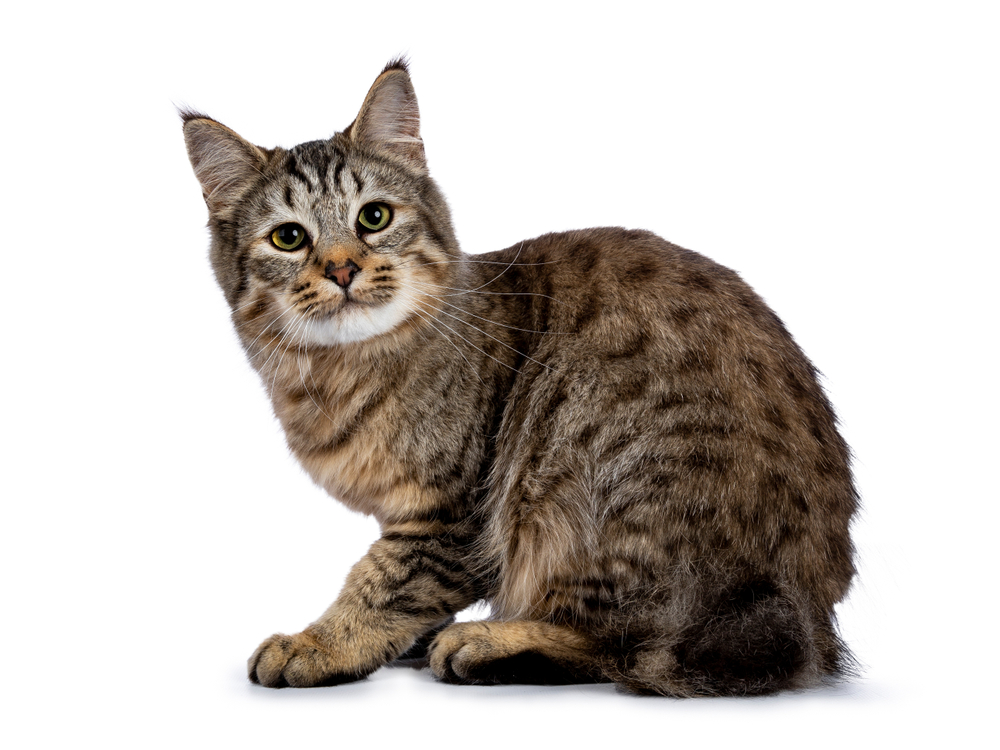
| Lifespan: | 13 – 15 years |
| Temperament: | Affectionate and playful |
| Coat Colors: | Brown tabby with classic, mackerel, spotted, or rosette patterns |
| Weight: | 8 – 25 pounds |
| Shedding: | Medium to high |
Many people believe that the Pixie-Bob breed resulted from a litter of kittens with a domestic cat mother and a bobcat father. While there’s no definitive proof to show that that’s the case, it would explain where their bobbed tail came from! These cats can get quite large, with some cats growing up to 25 pounds. Despite their potential wildcat genetics, Pixie-Bobs are calm and mellow. They love spending time with their humans and even enjoy going for walks and car rides. They’re patient and adaptable enough to enjoy life in a busy household with kids and other pets.
13. Bengal
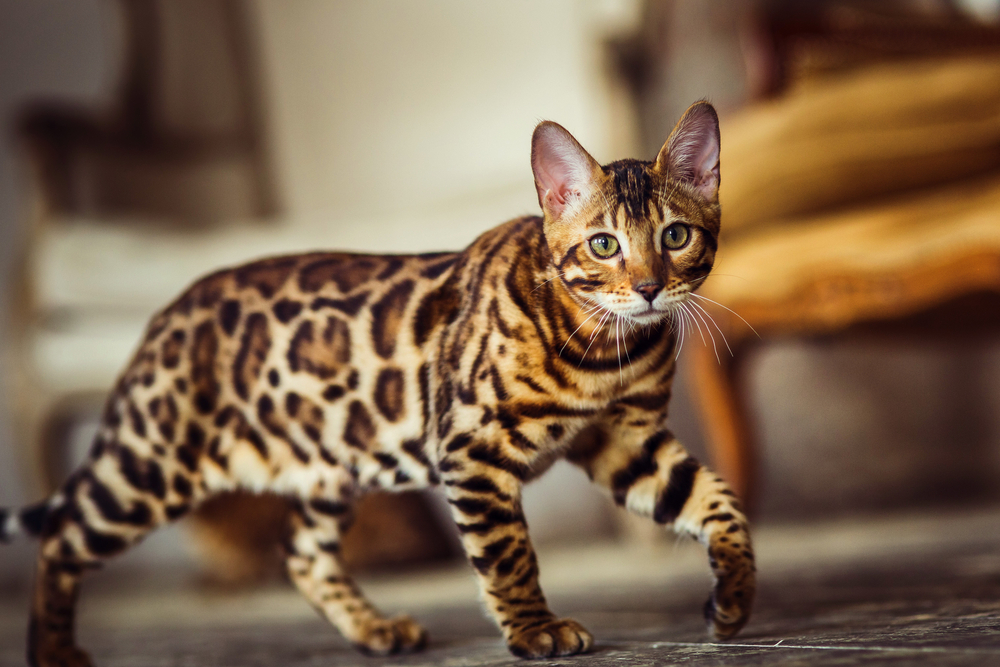
| Lifespan: | 10 – 16 years |
| Temperament: | Active and intelligent |
| Coat Colors: | Brown, silver, and snow |
| Weight: | 8 – 17 pounds |
| Shedding: | Low to medium |
The athletic and powerful Bengal looks like a wild cat, and that’s because they are — at least, in part. The breed was created by crossing wild Asian Leopard cats with Domestic Shorthairs. Modern-day Bengals are at least four generations removed from their wild ancestors, so while they look wild, they’re a true domestic breed. Bengal cats are highly intelligent, and while they’re often quiet, some can be more talkative than others. This breed needs a great deal of entertainment and attention; otherwise, they may turn their intelligence to creating havoc and destruction!
14. Abyssinian
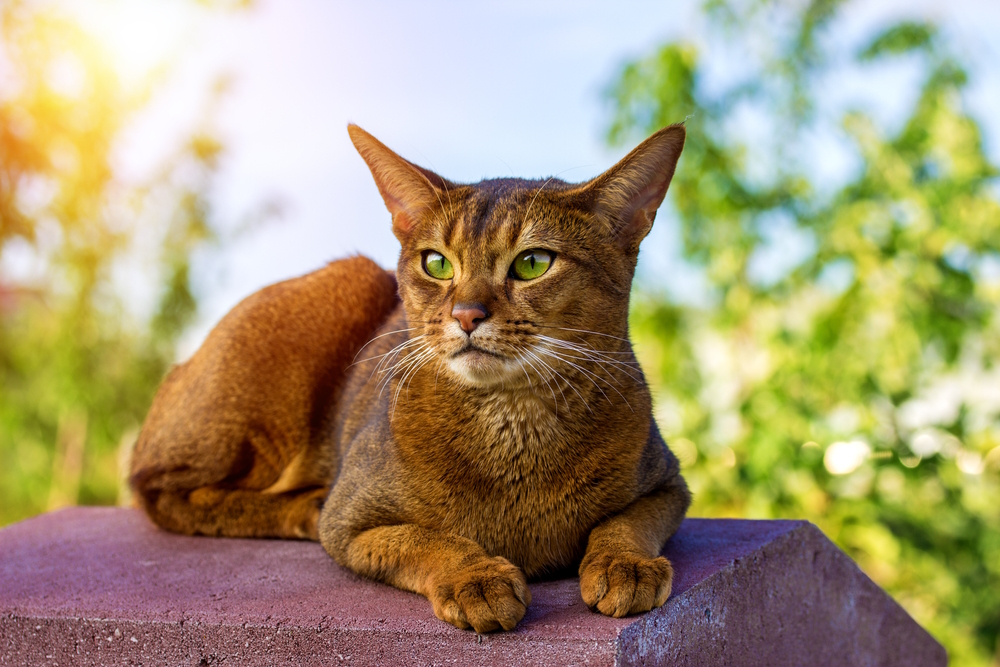
| Lifespan: | 9 – 15 years |
| Temperament: | Playful |
| Coat Colors: | Wide variety, including sorrel, blue, silver, and fawn |
| Weight: | 6 – 10 pounds |
| Shedding: | Medium to high |
The Abyssinian breed came to light at the first-ever cat show held in 1871 at the Crystal Palace in London. The exact origin of the breed is unclear, but they’re thought to come from Southeast Asia. Their classic coat color is a rich ruddy-ticked brown known as “usual,” but they’re also found in other colors. These active cats are vocally quiet but live life to the full in every other sense. They’re active and playful and adore jumping to the highest spots that they can find. Life is never dull with an Abyssinian in your house!
15. Russian Blue
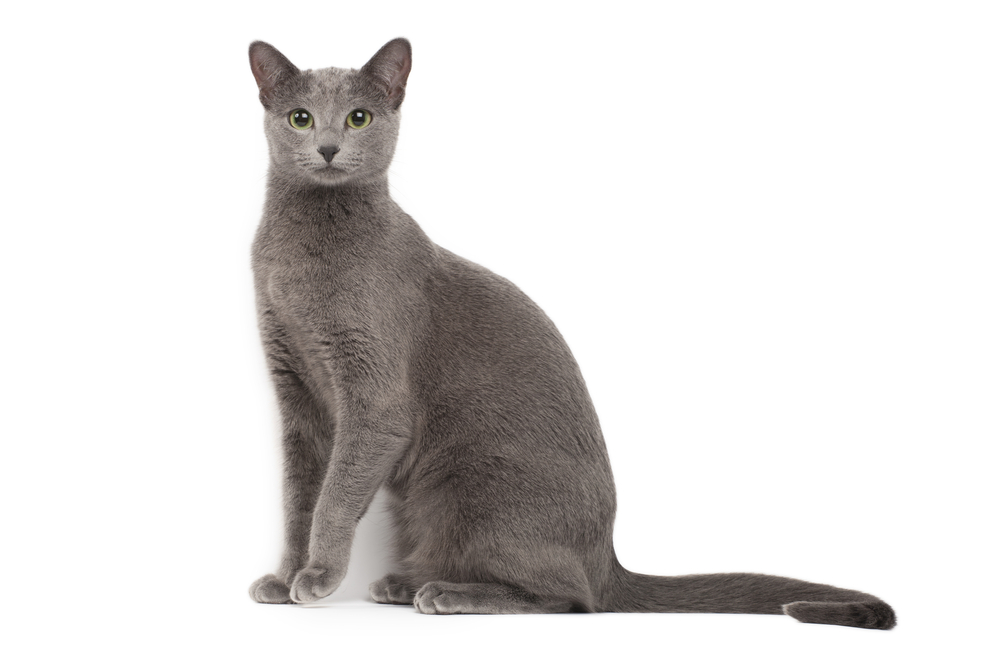
| Lifespan: | 10 – 15 years |
| Temperament: | Reserved yet playful |
| Coat Colors: | A range of blue-grays, from deep slate blue to pale silver gray |
| Weight: | 7 – 15 pounds |
| Shedding: | Medium to high |
The exact origins of the striking Russian Blue are lost in history, but it’s thought that they may have first been found on Archangel Island in Russia. Their dense coat comes in a range of striking blue-gray shades and is one of their defining features. The Russian Blue might be reserved around people whom they don’t know, but they have a playful side too. With their owners, they are loyal and can become extremely attached to one family member in particular. They are a sensitive breed and might not be loud enough to demand attention, but they can become anxious or stressed if they feel ignored.
16. American Shorthair
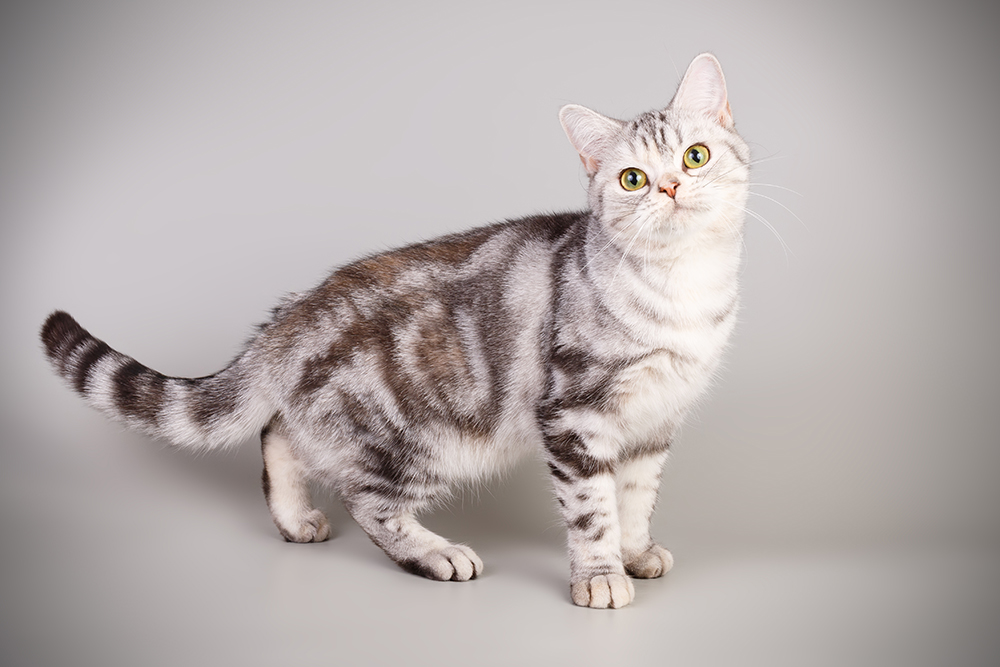
| Lifespan: | 15 – 20 years |
| Temperament: | Good-natured and adaptable |
| Coat Colors: | Almost all colors and a variety of patterns |
| Weight: | 7 – 12 pounds |
| Shedding: | Medium to high |
The American Shorthair’s heritage can be traced back to the cats that were kept as mousers aboard the Pilgrim ships arriving at Plymouth in 1620. This breed was exhibited at the first cat show in the U.S.A., held in 1895. These cheerful and adaptable cats are a classic choice for many families and for good reason. They’re relatively active but not overly demanding. They get along well with other pets and are patient around children too. They’re also sociable and smart, so they enjoy learning tricks and playing with their owners.
These cats are not overly noisy but will always appear when mealtime is near! The one thing that this breed isn’t fond of is being picked up or carried. They might not sit on your lap either, but they’ll probably pick a spot right next to you.
17. Norwegian Forest Cat
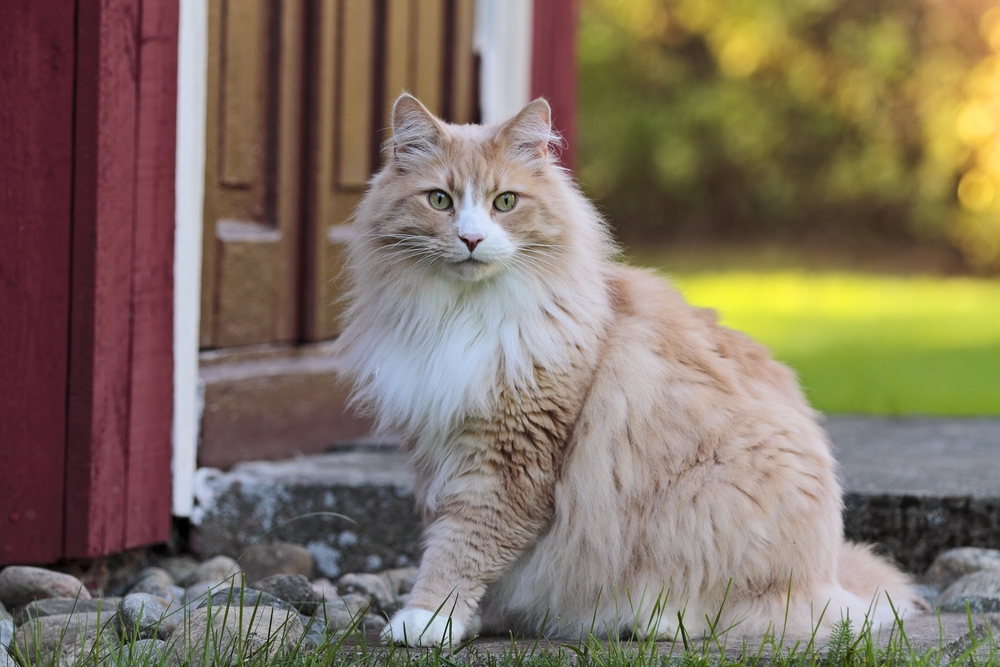
| Lifespan: | 12 – 16 years |
| Temperament: | Friendly yet independent |
| Coat Colors: | Many different shades |
| Weight: | 13 – 22 pounds |
| Shedding: | Medium to high |
The large Norwegian Forest Cat is often called “Wegie” by their fans, and there are many families who love these affectionate yet independent cats. This breed is native to Norway, where they’ve inhabited the snowy forests for thousands of years. Their soft and dense undercoat helps protect them from cold, while their water-repellent topcoat keeps them dry.
These large cats are athletic and love the opportunity to climb whenever they can. You’ll often find them perched on the highest shelf in your house, so offering them multiple climbing opportunities is a must. They’re affectionate yet undemanding, and you won’t often hear them make a noise unless they really need something.
18. Exotic Shorthair
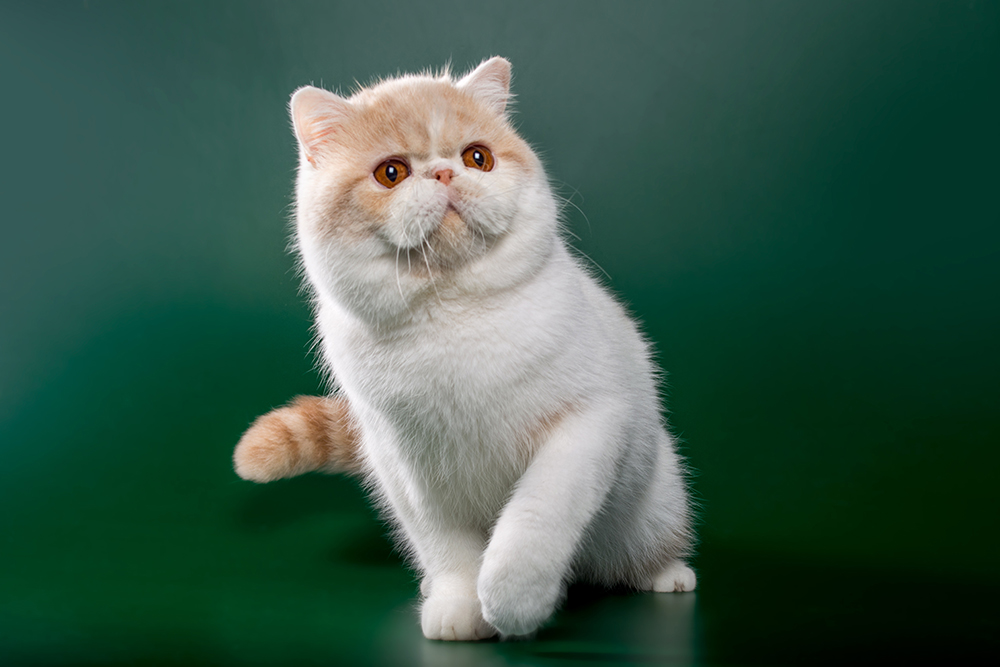
| Lifespan: | 8 – 15 years |
| Temperament: | Calm yet playful |
| Coat Colors: | Almost all shades |
| Weight: | 7 – 12 pounds |
| Shedding: | Medium |
The Exotic Shorthair is the short-haired version of the Persian. They were developed in the 1950s by crossing Persians with a range of short-haired cats, including the American Shorthair, Russian Blue, and Burmese. The breed was recognized by the Cat Fanciers Association in 1967. You may sometimes see them simply called “exotics.” These calm and gentle cats blend playfulness with a chilled-out demeanor. They’re quiet, and if they do make a noise, it’s likely to be a soft meow rather than anything loud or more demanding.
19. British Shorthair
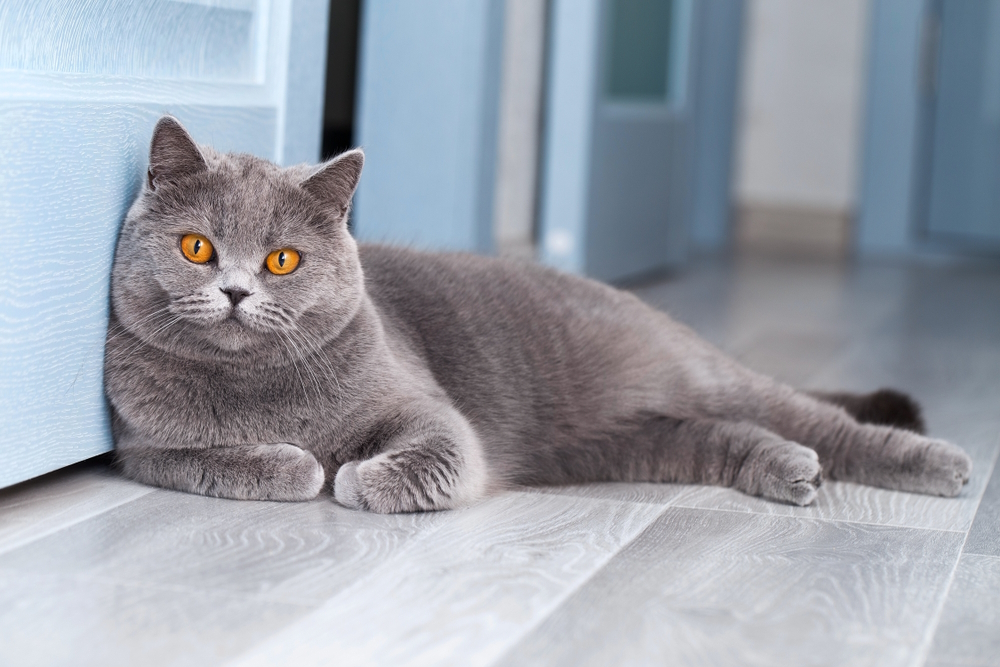
| Lifespan: | 12 – 17 years |
| Temperament: | Reserved and laidback |
| Coat Colors: | Almost all shades |
| Weight: | 7 – 17 pounds |
| Shedding: | Medium |
British Shorthair cats are an ancient breed thought to originate in Roman times. Made famous by characters like Puss in Boots and the Cheshire Cat from Lewis Carroll’s Alice in Wonderland, the British Shorthair breed won best in show at the very first cat show. This breed is laidback and makes a great choice as an all-around family cat. They enjoy attention but are not demanding, so you can expect them to follow you around the house without being loud or demanding about it. British Shorthairs aren’t keen on being picked up or sitting on your lap, but they do love to be right next to you whenever possible.
20. Somali
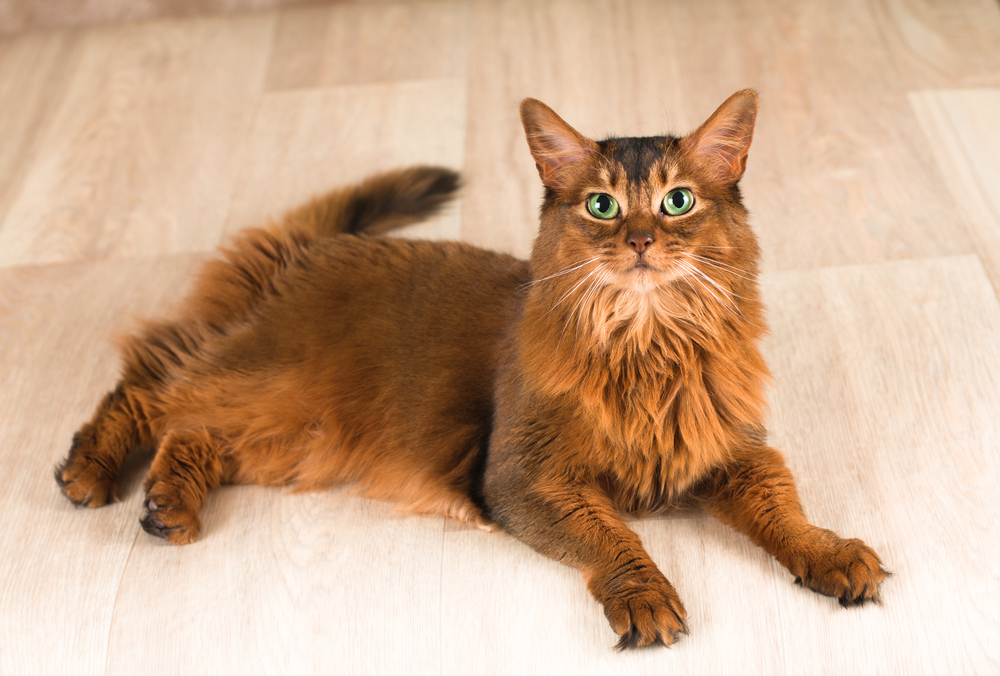
| Lifespan: | 11 – 16 years |
| Temperament: | Sociable and smart |
| Coat Colors: | Red, burnt sienna, fawn, and blue, all with ticking |
| Weight: | 6 – 10 pounds |
| Shedding: | High |
The Somali is the long-haired cousin to the Abyssinian breed and was first discovered in the 20th century. It’s thought that the breed originates from Southeast Asia and may have been brought to Europe by oceanic traders. These cats are quiet but not inactive. They love to play, jump, and explore their surroundings with enthusiasm. They’re also incredibly intelligent, so they will benefit from plenty of interaction and play. They don’t enjoy spending long periods on their own, and while they’re not overly vocal, they still have plenty of techniques to catch your attention!
Conclusion
While each cat is an individual and it can be hard to tell if they’ll be vocal or not, there are some breeds that tend to be quieter than others. Of course, that doesn’t mean your cat will be silent all the time. After all, how will they tell you that they need their food bowl filled up?
Featured Image: absolutimages, Shutterstock
Contents
- The 20 Silent Cat Breeds
- 1. Chartreux
- 2. Birman
- 3. Havana Brown
- 4. Cornish Rex
- 5. Ragdoll
- 6. LaPerm
- 7. Singapura
- 8. Persian
- 9. Siberian Cat
- 10. Scottish Fold
- 11. American Curl
- 12. Pixie-Bob
- 13. Bengal
- 14. Abyssinian
- 15. Russian Blue
- 16. American Shorthair
- 17. Norwegian Forest Cat
- 18. Exotic Shorthair
- 19. British Shorthair
- 20. Somali
- Conclusion

